

Home - GPoM. Mayors Challenge 2014: Home. Freedom to Riot: On the Evolution of Collective Violence. The views expressed are those of the author and are not necessarily those of Scientific American.

From London to the Middle East riots have shaken political stability. Are the answers to be found in human nature? "Anarchy" by Nathaniel Gold Police cars were overturned and shops looted as the mob descended on the city’s central square. Rioters tore the police station’s outer door off its hinges and “used it as a battering ram” to break inside. The portrait of a powerful leader was pulled from the wall and sent dangling from a balcony as angry voices below cursed him and the other “fascists” believed responsible for their condition.
The Novocherkassk riot on June 2, 1962, was Soviet Russia’s largest public uprising to date. But when authorities inadvertently fired on unarmed civilians the “noisy, aggressive, and far less reasonable members determined its focus and direction,” wrote historian Vladimir Kozlov in his book Mass Uprisings in the USSR (M.E. Da Lench Mob Ft Ice Cube - Guerrillas In The Mist. Grandmaster Flash & The Furious Five - The Message. HD Stock Footage Watts Riots Los Angeles 1965. Reading the Riots: 'It was a war, and we had the police scared' - video. UK riots 2011. Twenty Years After the Riots part 1 - Los Angeles Times. A Marine general with ties to Camp Pendleton has been nominated to become the next commandant of the Marine Corps, the Pentagon announced Thursday.

Secretary of Defense Chuck Hagel has nominated Gen. Joseph E. Dunford Jr. to be the 36th commandant, succeeding Gen. James Amos, who is set to retire this fall as the top general in the Marine Corps. Dunford, 58, is the top U.S. and NATO general in Afghanistan. Max Weber Methodology. Max Weber Theory. Van Bagdad naar Londen: Lessen uit duizend jaar stedelijke netwerken in Europa en de Arabische werel.
Waarom begon de industriële revolutie eigenlijk in noordwest Europa?

Tegen het einde van het eerste millennium was Europa nog een achterlijk deel van de wereldeconomie met een lage graad van verstedelijking en een dito inkomen. Maar tussen 1000 en 1800 ontwikkelde Europa zich van een economisch achtergebleven gebied tot de meest dynamische regio in de wereldeconomie. Het verklaren van deze ontwikkelingen is één van de grote uitdagingen voor historici en economen. Instituties, maar welke? De belangrijkste hypothese ter verklaring van de opkomst van Europa betreft de rol van instituties. Douglass North (1981) benadrukt dat de sociaal-politieke instituties die plundering door de staat beperkten het belangrijkste waren voor de ontwikkeling van Europa. In onze bijdrage aan dit debat met een recente paper (Bosker et al. 2008), vergelijken we de lange-termijn ontwikkelingen tussen 800 en 1800 van de stedelijke systemen in Europa en de Arabische wereld met elkaar. Detroit Burning: Photos From the 12th Street Riot, 1967.
Forty-five years ago, during the long, hot summer of 1967, the city of Detroit erupted in one of the deadliest and costliest riots in the history of the United States.
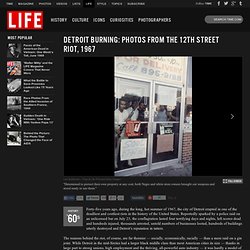
Reportedly sparked by a police raid on an unlicensed bar on July 23, the conflagration lasted four terrifying days and nights, left scores dead and hundreds injured, thousands arrested, untold numbers of businesses looted, hundreds of buildings utterly destroyed and Detroit’s reputation in tatters. The reasons behind the riot, of course, are far thornier — socially, economically, racially — than a mere raid on a gin joint. While Detroit in the mid-Sixties had a larger black middle class than most American cities its size — thanks in large part to strong unions, high employment and the thriving, all-powerful auto industry — it was hardly a model of racial harmony. Throughout it all, photographer Lee Balterman (who died in March 2012 at the age of 91) was there, recording the terrible scene. Readers by the dozens have shared their memories of the 1992 Los Angeles riots, which erupted 20 years ago this week.
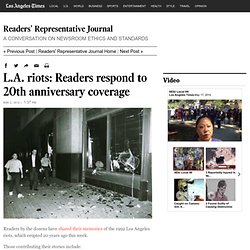
Those contributing their stories include: A former National Guardsman A retired L.A. 1992 riots timeline. Photographer recounts covering the 1992 Los Angeles riots. Photos: The 1992 Los Angeles riots. On April 29, 1992, a jury in Ventura County acquitted four LAPD officers of beating Rodney G.
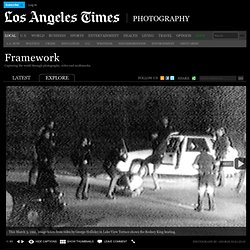
King. The beating, caught on amateur videotape, sparked a national debate about police brutality and racial injustice. After the verdict, angry crowds gathered on street corners across Los Angeles. Private Video. N.W.A – Fuck The Police Lyrics. N.W.A FUCK DA POLICE. American urban unrest. Photo: Newark, 1967 Several recent posts have focused on periods of civil unrest in other countries -- France and Thailand most recently.
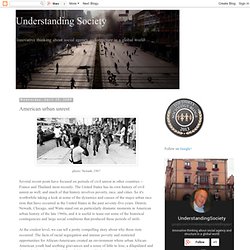
The United States has its own history of civil unrest as well; and much of that history involves poverty, race, and cities. So it's worthwhile taking a look at some of the dynamics and causes of the major urban race riots that have occurred in the United States in the past seventy-five years. Detroit, Newark, Chicago, and Watts stand out as particularly dramatic moments in American urban history of the late 1960s, and it is useful to tease out some of the historical contingencies and large social conditions that produced these periods of strife. At the crudest level, we can tell a pretty compelling story about why these riots occurred. UNIVERSITY. Brief Historical Overview.
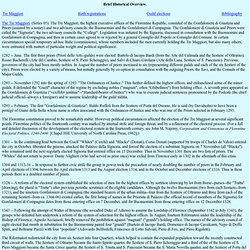
The Tre Maggiori. (Series 05). De Monarchia. Internet History Sourcebooks Project. Medieval Sourcebook: Marsiligio of Padua: Conclusions from Defensor Pacis, 1324 [Thatcher Introduction] Defensor Pacis is a treatise on politics written by Marsilius or Marsiglio, a canon of the church of Padua, in 1324.
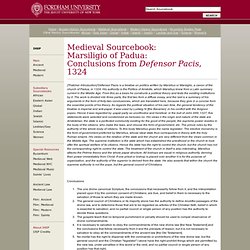
History of Florence and Of the Affairs Of Italy, by Niccolo Machiavelli. Benjamin Barber: Why mayors should rule the world.